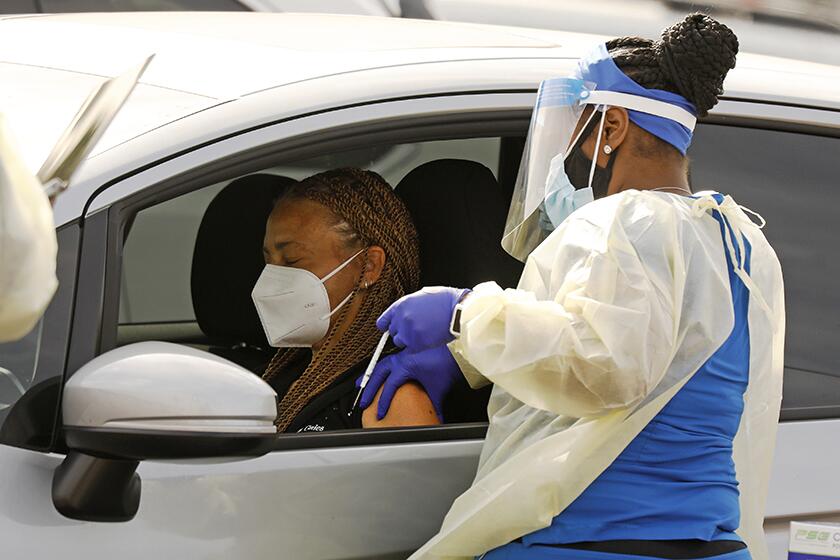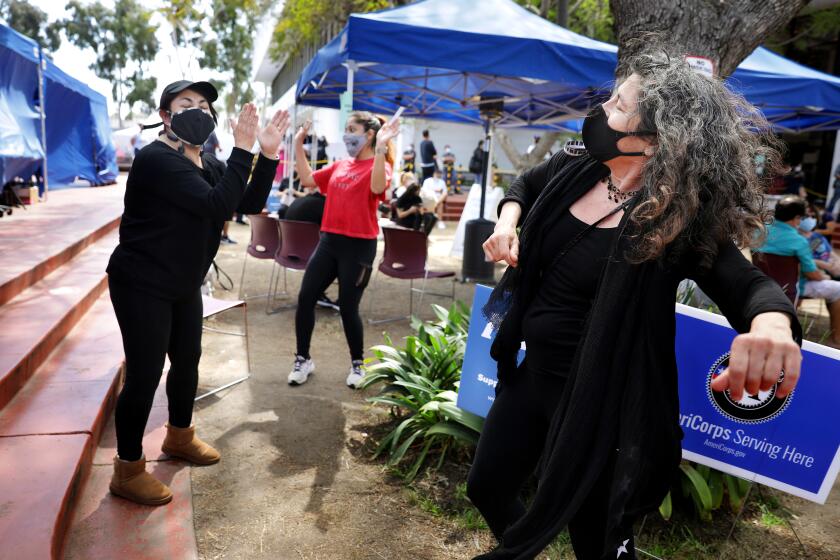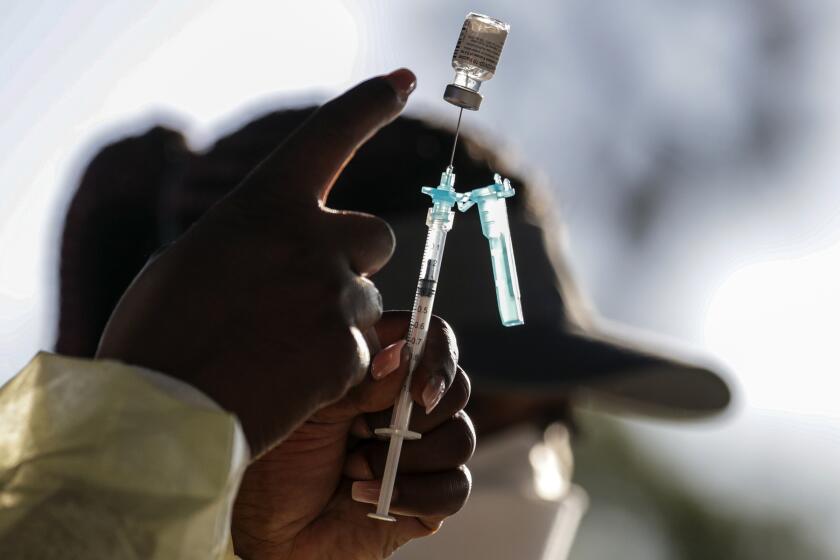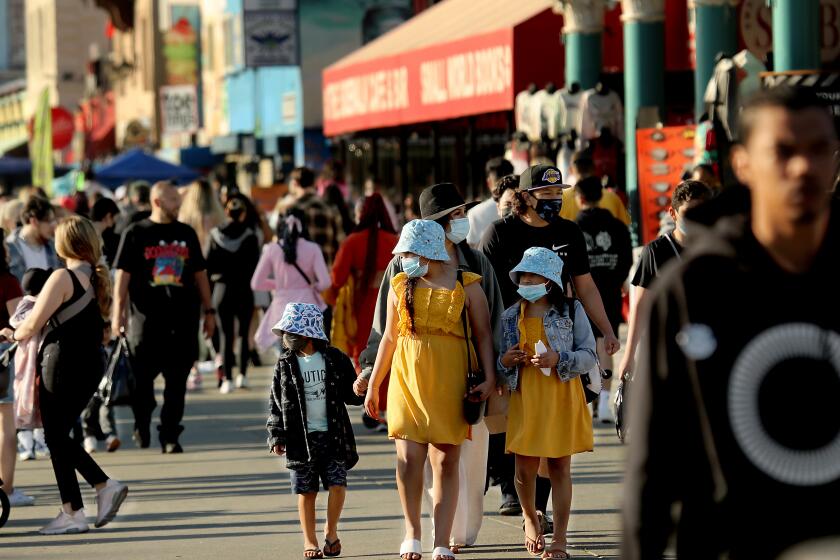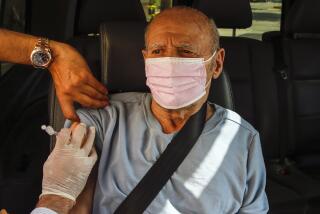All California adults can get COVID-19 vaccine next month
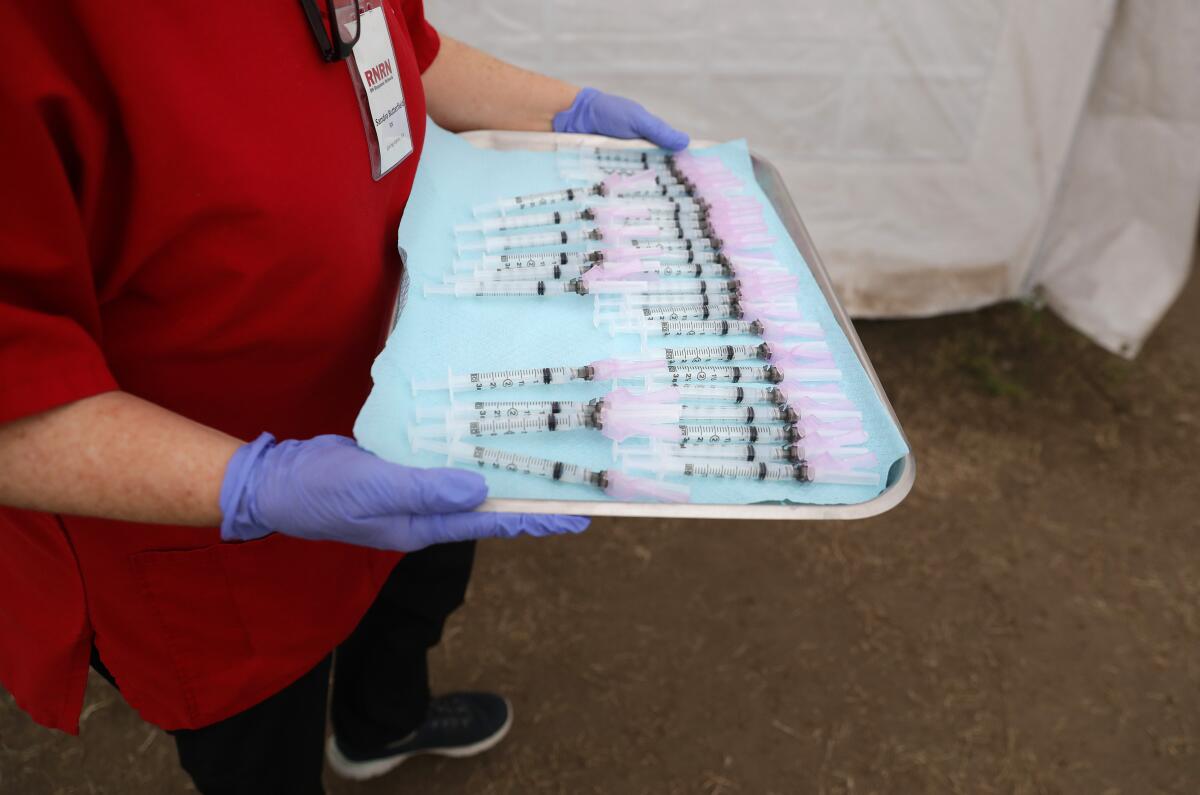
California is dramatically expanding the eligibility for COVID-19 vaccines, offering the shots to virtually all residents 16 and older beginning next month, the state announced Thursday.
Residents who are at least 50 years old can get vaccines starting April 1, and all Californians 16 and older will be eligible starting April 15.
State officials said the dramatic move is based on expected increases in vaccine supply.
“There’s not just light at the end of the tunnel; there’s bright light at the end of the tunnel,” Gov. Gavin Newsom said during a news conference in Santa Ana.
Among those who will become eligible starting next Thursday is Newsom himself.
“I look forward to getting the best shot — and the best vaccine is the next one available,” Newsom, 53, said.
Now that eligibility is expanding to all California adults, we’ve put together a list of the different ways you can try to make an appointment to get a COVID vaccine in Los Angeles County.
California’s move to universal adult eligibility would come about two weeks before the May 1 target set by the Biden administration. A growing number of states, including Alaska, West Virginia and Mississippi, have previously expanded eligibility to residents 16 and older.
As has been the case throughout the rollout, eligibility does not guarantee immediate access to an appointment.
The timing of scheduling appointments also remains somewhat of an open question. The California Department of Public Health said Thursday that residents could go through their doctor’s office to begin booking their shots, so long as the actual appointments are on or after the day they become eligible, April 1 or 15. Depending on their eligibility, residents will be able to reserve an appointment through the state’s My Turn scheduling site on April 1, April 15 or later.
Dr. Nancy Gin, regional medical director of quality and clinical analysis with Kaiser Permanente, said the network also is not able to “pre-schedule appointments in advance of these eligibility dates.”
“We encourage all who are eligible to get vaccinated as soon as possible,” Gin said. “Until most of the community is vaccinated, everyone should continue to maintain healthy behaviors, including wearing a mask, washing hands often, and avoiding crowds, even after vaccination, to help ensure we are not spreading the virus.”
When asked why he feels comfortable with widely opening the door for inoculations, Newsom’s answer was simple: “Abundance.”
He said the state had received promising guidance regarding the forthcoming supply of vaccines — including doses of Johnson & Johnson, which requires a single shot.
The two other vaccines being used in the U.S., one from Pfizer-BioNTech and the other from Moderna, entail two doses, administered three and four weeks apart, respectively.
“Our ability to do more has always been constrained by supply, manufactured supply,” Newsom said. “We have confidence, now, of the manufactured supply becoming available sooner than we had anticipated.”
For people who do not yet qualify for a COVID-19 vaccine in their area, there are limited options for obtaining a coveted dose.
State officials said California expects to be allocated about 2.5 million first and second doses per week over the first half of April — with that number growing to more than 3 million doses later in the month.
By comparison, the state has recently received only about 1.8 million total doses a week.
Even with the expected increase in vaccines, state officials emphasized that it probably will take several months to vaccinate everyone who wants a shot.
So far, providers statewide have administered more than 15.5 million doses, according to data compiled by The Times. Almost 27% of Californians have received at least one dose, and nearly 5.5 million residents are fully vaccinated.
Los Angeles County Supervisor Hilda Solis applauded the state’s announcement Thursday.
“This is momentous news and, after a year that has devastated the lives and livelihoods of millions of residents across Los Angeles County, could not come soon enough,” she said in a statement. “We will adhere to the state’s guidelines as we did back in January, when I issued an executive order to expand vaccine eligibility to include adults 65 and older.”
The city of Long Beach, which has its own health department, is moving even quicker. Officials said they would immediately open vaccine eligibility to city residents who are at least 50 years old.
“We’re committed to making vaccinations available to as many people as possible,” Mayor Robert Garcia said in a statement.
Starting April 15, all Californians 16 and older will be eligible for a shot. Here are the basics and info on getting your shot.
Despite the upcoming eligibility changes, state officials said they’re not shifting from what they’ve long characterized as the guiding principle of California’s vaccine rollout: equity.
Starting earlier this month, the state began earmarking 40% of its available COVID-19 vaccines to residents in the most disadvantaged areas — those in the lowest quartile of a socioeconomic measurement tool called the California Healthy Places Index.
That allotment will continue, officials said.
“We are not walking away from our equity commitments, quite the contrary,” Newsom said. “We’ll continue to double down on all of those equity frames. We’re not running the 90-yard dash on that; it wasn’t just an announcement and we’re moving on to the next thing. We truly want to flood those areas.”
As part of that goal, state officials announced Thursday that providers will now have the discretion to vaccinate anyone who lives in the most deeply affected, socioeconomically disadvantaged areas.
“We’re taking down barriers to access of the vaccine,” said California Health and Human Services Secretary Dr. Mark Ghaly.
The state already expanded vaccine eligibility to nearly 5 million Californians with disabilities and underlying health conditions earlier this month. But for weeks, state and local officials have warned that supply would remain flat until late March or early April when vaccine allocation was expected to increase significantly. Until then, access to the vaccine has remained constrained in various parts of the state.
But some counties have already expanded vaccine eligibility beyond state guidance. At least four lowered the age threshold to 50, and one dropped it to 45. And some counties have expanded eligibility to health conditions beyond the state’s specifications.
The decision to expand priority has been based on a variety of factors, including a surplus of doses due to vaccine hesitancy.
Recent screenings of a limited number of samples indicate that coronavirus mutations that may spread more easily are circulating in L.A. County.
Despite the promising news on the vaccine front, state officials emphasize that residents must remain vigilant.
Though California’s numbers are improving — the state has reported an average of 2,708 new coronavirus cases per day over the last week, a 34% decrease from two weeks ago, Times data show — other parts of the country and the globe are wrestling with renewed outbreaks.
The circulation of even more infectious coronavirus variants, including a homegrown California strain, remains a top concern.
“It really is, in some ways, a race of vaccines against variants,” Ghaly said.
Until significantly more people are inoculated, Newsom said, it’s vital for Californians to continue taking steps to protect themselves and others from potential infection.
“These mutations should make us mindful of the moment we’re in,” he said. “It’s not mission accomplished. We’re not spiking the football. This is not time to take down your guard — or, literally, as is the case, take off your mask.”
Times staff writer Hayley Smith contributed to this report.
More to Read
Sign up for Essential California
The most important California stories and recommendations in your inbox every morning.
You may occasionally receive promotional content from the Los Angeles Times.
